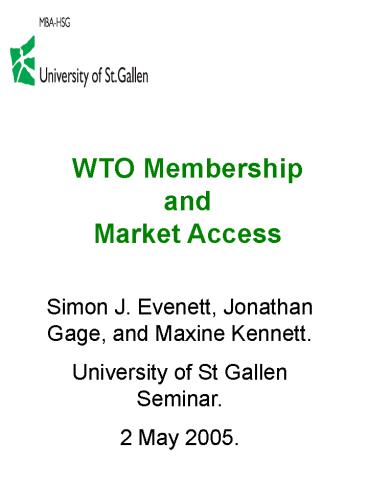Simon J. Evenett, Jonathan Gage, and Maxine Kennett. - PowerPoint PPT Presentation
1 / 18
Title:
Simon J. Evenett, Jonathan Gage, and Maxine Kennett.
Description:
Quid pro quo at the heart of the world trading system. WTO accessions. ... Improved 'security' of access (Cordell Hull, Jackson, diplomats, etc. ... – PowerPoint PPT presentation
Number of Views:76
Avg rating:3.0/5.0
Title: Simon J. Evenett, Jonathan Gage, and Maxine Kennett.
1
WTO Membership andMarket Access
Simon J. Evenett, Jonathan Gage, and Maxine
Kennett. University of St Gallen Seminar. 2 May
2005.
2
Motivation and Hypotheses.
- Quid pro quo at the heart of the world trading
system. - WTO accessions.
- Two hypotheses concerning the effects of WTO
accession on exports - Falling MFN tariff rates.
- Improved security of access (Cordell Hull,
Jackson, diplomats, etc.)
3
Doubts about these hypotheses.
- Doubts raised by scholars
- Rose and successors.
- Doubts raised by trade negotiators from SSA,
South Asia, and Caribbean during the Doha Round. - Role of preferential market access.
- Preference erosion.
4
Industrial country tariff regimes terminology.
- WTO-related tariff regimes
- Bound and applied rates.
- Reciprocity.
- Free trade areas.
- Preferential tariffs for exporters from
developing countries. - GSP.
- Non-reciprocal and discretionary.
- Differences in terms and security of market
access.
5
Departure from literature.
- Ongoing versus new WTO membership.
- Modern gravity approaches.
- Aggregate bilateral trade flows.
- Long panels.
- Controls.
- Identification Dummy variables.
- But what are the mechanisms?
- Country studies.
- GSP regimes.
6
Empirical strategy.
- Evaluate two hypotheses concerning export growth
of two recent WTO accessions to Quad countries,
using modern gravity approaches, disaggregated
trade flow and barrier data, and numerous
controls. - Why Bulgaria and Ecuador?
- Why the Quad countries?
- Why disaggregated trade data?
7
Link to modern gravity theory.
8
Base estimating equation.
9
Augmented estimating equation.
10
Trade data collected.
- Statistics Canadas World Trade Analyzer
database. - Dependent variable.
- Market size variable
- Value of production
- Proxy constructed.
- Product-line specific fixed effects.
11
Tariff data collected.
- UNCTADs TRAINS database.
- 6 digit to 4 digit product lines.
- GSP tariff rates.
- PTA tariff rates.
- MFN tariff rates.
- Proxy for pre-accession tariff rates.
12
Parameter estimates.
13
Parameter estimates.
14
Other specifications for Bulgaria
15
Other specifications for Ecuador.
16
Other comments on parameter estimates.
- gt35 specifications estimated for both countries.
- 5 values of variable a.
- Systematic trimming of outliers.
- Performance of control variables.
- Market size variable.
- Proxy for production levels.
17
Quantitative significance of parameter estimates.
- Bulgaria 19.24 of post-accession export growth
to industrialised countries can be attributed to
falling MFN rates. - Ecuador 1 reduction in MFN rates increases
trade by at least 2. - These two countries trade flows have been
non-trivially affected by WTO membership.
18
Summary of findings.
- Cannot reject one WTO accession-related
hypothesis in each country. - Interaction between GSP and MFN rates.
- Caveats
- Noisy data.
- Short panel.
- Inability to observe uncertainty faced by
exporters. - Endogenity of tariffs and NTBs.
























![get [PDF] Download Jonathan Little on Live No-Limit Cash Games, Volume 1: The Theory PowerPoint PPT Presentation](https://s3.amazonaws.com/images.powershow.com/10069143.th0.jpg?_=20240701052)
![[PDF] Jonathan Unleashed: A Novel Full PowerPoint PPT Presentation](https://s3.amazonaws.com/images.powershow.com/10089898.th0.jpg?_=20240801025)





